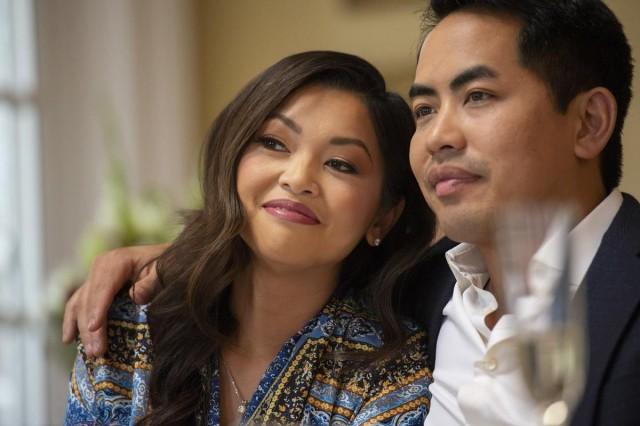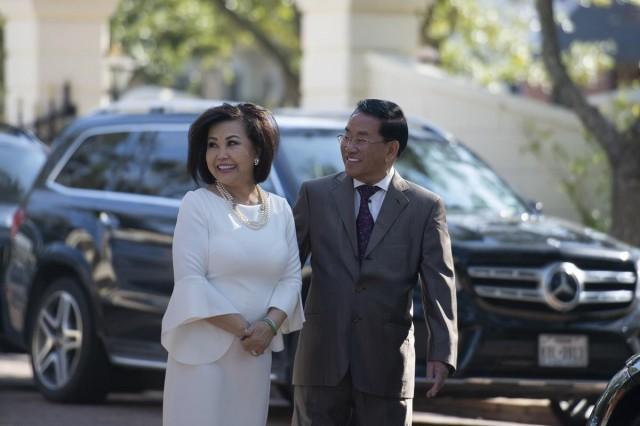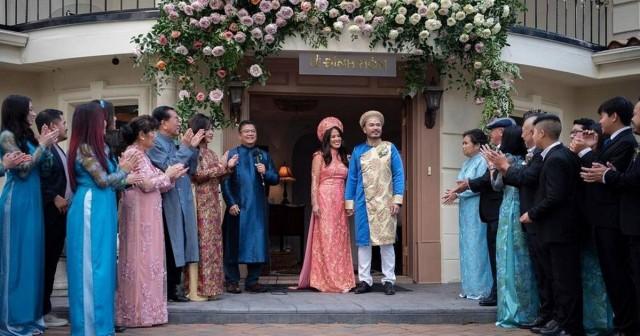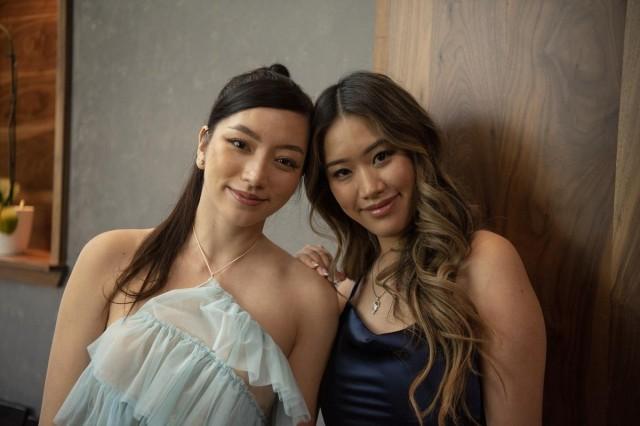After 'Crazy Rich Asians' and 'Bling Empire,' here comes the 'House of Ho'

LOS ANGELES — So you think you have seen it all after watching the crazy rich Asians in the movie and more in the TV show "Bling Empire." Well, guess what, here comes the rich Vietnamese American Ho family in the reality TV show the "House of Ho" to give American audiences a peek on what goes inside their family, including practicing their Asian traditions and all the non-traditional drama that goes on in every family.
The docuseries follows the life of the Ho family led by patriarch Binh Ho and his wife, Hue Ho, who are living the American Dream with their children Judy Ho, Washington Ho and wife Lesley, in Houston, Texas. There are also other members of the family like cousins Bella and Kim Ho, Aunt Tina, Cousin Sammy, among others.
Now on its second season at HBO Max, "House of Ho" was first released last December 2020.
We were able to talk to some members of the Ho family by Zoom. Below are excerpts from our interviews.
Washington and Lesley Ho, Judy Ho

Congratulations. You're on the second season of this reality show. Talk about why you wanted to do a reality show. And what do you think audiences will get from watching your show?
Washington Ho: I wanted to do a reality show, because I thought it was a great opportunity that could lead to potential business opportunities for our family. We're involved in many different types of businesses, including real estate and banking. I saw the success of other reality show families like the Kardashians that inspired me. And I hope audience will take away that no matter how hard life gets, never give up and always embrace your family, give hugs and kisses whenever you can.
Lesley Ho: Judy and I did the reality show more so when Washington had this crazy idea and we didn't think it was going to get picked up or happen, but now that we're here, I think with Season Two, you'll see a lot of the importance of family and the cultural values that we present and how that's at the heart of our family.
Judy Ho: I did this show purely, because I love my brother and he wanted me to do this for him. And here we are today and I'm glad that people can relate to us.
One thing that is truly inspiring is seeing your parents, how they were struggling immigrants and how they made it in the United States. Because we're Asian and we're always trying to do our best when we are in the United States to make our dreams come true. So, what were some of the lessons you found out from your parents?
Judy Ho: I've learned from my parents that whatever odds are against you, like they didn't speak the language and they came here with nothing in the middle of a war. And it's just inspiring to know that even if you came from nothing and you have nothing, that's handed to you, that hard work, ingenuity can pay off.
Washington Ho: I learned the same thing. Growing up we saw our parents work hard and struggle every day so that we could achieve our own version of the American Dream. They didn't know anybody, they didn't really speak the language, but they built a successful company. And I feel, my sister, my wife and I we're doing the same thing. We didn't know anybody in the reality show space or Hollywood, but we're just trying to make it happen and open up eyes to other Asians around the world that anything is possible, but you've got to be able to step outside the box and dream big and go for it.
Lesley Ho: What I learned from both my parents and his parents is not just the hard work, but how children are such a huge motivating factor. Our parents didn't come over here to work hard for themselves. They worked hard for us so we could have a better life and for their grand babies and future generations. They set up a foundation knowing that they're going to suffer and may not achieve something in their lifetime, but hopefully set something up for our lifetimes.
Washington, what do you think of your father naming you boys after presidents? Doesn't that give you too much pressure or stress?
Washington Ho: Yes, it definitely does. Growing up all my life, my dad would remind me that I was named after the greatest leader the world has ever known and that I have to step into those shoes because I'm the first-generation Vietnamese from the Vietnam War. And that anything I did was going to be magnified. But growing up, watching my father's success, not only did my parents have pressure on me, but the expectations of my community, that either I would have to step into my father's shoes or be better, which is part of the Asian culture. That the man has to be better or equal to his father. It's definitely difficult. And the way I coped with that was not correct. And I've tried to correct it the past few years, especially on TV to inspire other males like myself, that you can make changes and that your family, your wife is worth more than any fun you could have with your friends.
Judy, you're the rebel in the family. You are very outspoken, and you always put Washington in his place. So, what do you think, would you raise your children the same way that you were raised with favoring the son over the daughter?
Judy Ho: After growing up in Washington's shadow, and I know how it feels on this side. I know Washington loves it because he doesn't know anything different, but for me growing up in his shadow and knowing that I had a different set of rules, I definitely don't want to raise my children that way. I want them to know that I love all of them equally. And that I love them equally and I will treat them equally. And that just because one child is the favorite doesn't mean they can get away with everything. Because then that leaves me and Reagan (the other Ho brother) feeling like what about us? And I don't want my children to feel that way.

Lesley, you're like the outsider looking in, you see the whole family as they are with all the partying and the expenses. What would you do? How would you raise your children?
Lesley Ho: I want to raise them to be humble. Roosevelt is very spoiled by his grandparents and his dad, anything he wants, he gets. I want to raise him to be humbler, work for a dollar, what a dollar's worth. Save up for college, not save up for toys, little things like that I have been trying to just beat in him, being in this family.
Reagan Ho is the most different from the three of you. Why do you think he doesn't want to participate in the reality show?
Judy Ho: Because he's the sane one?
Washington Ho: Yeah.
Can you please elaborate?
Judy Ho: Reagan is a very private person and he's always been that way. And for him to really show his private life that would ask too much of Reagan. Reagan, when he does appear, he really does that as a favor for my mom, because my mom wants all three of us to be together on this show. But other than that, he'll do it for my mom here and there. But he would never ever show his private life.
Washington Ho: Growing up, Reagan would get annoyed if we even asked him like, "Hey, who are you dating?" If he was hanging out with some girl and I asked, "Hey, is that your girlfriend?" And of course, we would fight because he's like, "Why do you need to know?"

Judy, how do you think your fiancé, Nate, will be blending into the family and being accepted by the whole family? Do you think he can adjust?
Judy Ho: Oh, you know what, I think my family has really embraced Nate, even though they weren't supportive of my divorce in the first season, if they've come to see how Nate treats me and how much happier I am and how it should be between a husband and a wife, a marriage or relationship. I really think my parents like him more than they like me. He's just so nice to them, and he always makes sure they're happy. And here I am just always outspoken about things I don't like.
And finally, what would you teach your children about money?
Judy Ho: I would teach my children about money that they need to work for it and save for a rainy day. I just feel like nowadays they watch TV, and they watch these YouTube videos, and everything looks so easy to have these nice homes and these nice toys, and I just want them to know that it doesn't come easy.
Lesley Ho: Same with Judy, money is not easy to make. And when you do have it, you should save it for something serious that might happen later. Even though we live a good lifestyle now, there are things that happen in life that aren't always happy, and that life throws at you, and you need to be able to support yourself and be independent.
Washington Ho: I can only teach from my failures, and I was definitely spoiled. I also had a lot of wins in businesses and a lot of losses, but I never really cherished those dollars I made because I thought they would always come. And what I would teach my kids is to save the money as much as you can and reinvest. And save partying for later.
Bella and Kim Ho

Why did you want to join the reality show and what do you think audiences will get from watching this show?
Bella Ho: I personally wanted to join the reality TV show because I thought it was an amazing opportunity that will allow me to share my struggles and how I feel and what I'm going through as a 22-year-old, an Asian American 22-year-old, trying to figure out who I am, but also to stay true to my family roots. And what I think I bring to the show is that we bring a different perspective in the sense that Season One, you get to see Judy, Washington and Lesley and their struggles. But Season Two, you will see that younger generation and how we're still just trying to figure it out. Our older cousins have had so much more experience in time, and we haven't. And it's nice to see that there's advice being carried over and all of us giving advice to our cousins sometimes about just being free and remembering that even though they're parents, they're still individual people. They have every right to just enjoy their lives to their fullest, even when they have so many responsibilities.
Kim Ho: Yeah. The same way, representation is just very important. Growing up, I was shunned just for being Asian, whether it was the food I ate or the interests we have. But nowadays being Asian is popular, watching K-pop or watching anime or playing video games and doing all those things like eating Asian foods or eating sushi. That's cool now. And it's finally, even though it's mainstream now, we're able to share that even before it wasn't cool. Asians are going through so many problems. And being able to show that we face everyday problems just like everyone else and hopefully having at least one voice hear that and feel like they're not alone, I think that's just great motivation. Just put our story out there, even though we might be a little bit shy and nervous putting our lives out in public.
One very remarkable thing about the show is showing the struggle of the Binh Ho, the father, and Hue Ho, the mother, when they were struggling immigrants and then they made it in the United States. What do you admire the most about Binh Ho and Hue Ho?
Kim Ho: It's obviously not very easy to go from your home country and starting completely a new slate. It's something that we both appreciated about our aunt and uncle. They started off from nothing and were given nothing and they built an empire. They were able to give it to their children as well as their brother and sister's children. They're able to start off with a good foundation and not just from the very beginning, just like they had. It's also something that we want to share with them that even though we are very appreciative of all the sacrifices they've done to provide for us in our family, that we just want to share that we also are struggling through our own problems, even if it might not be for survival. It's our mental health, our career, and our relationships with other people.
Do you think it's harder for you, the young generation these days, to survive especially with the Asian hate crimes and everything else also going on in social media and the outside world?
Bella Ho: I don't think it's a harder or easier per se. I just think that everyone has been dealing with so many problems throughout their lives and everyone deals with things differently. Problems are just different. Our parents deal with things differently. We think of things differently. We deal with things differently. But that doesn't mean that one was harder than the other. It's just how we deal with them and what we go through.
Can you describe the Ho children, Judy, Washington, and Reagan? And who do you think should inherit or be the leader of the family business?
Kim Ho: Judy, Washington and Reagan's family is really similar to me. I am the oldest daughter who's often overshadowed by her younger brother because he's the male. And in our culture, the male carries on the family last name and our traditions. But what's so great and unique about being Asian American is that we're not in Vietnam anymore and women have so much power. They are career driven. They don't have to be homemakers anymore if they didn't want to. And respect to those who are because whether or not you're a career woman or a homemaker, the struggle is so real. But because of that, I don't necessarily think there should be anyone, a single person, running an empire. They can do it together. And that's so great about living in America is that it's not just me, me, me, me, me. It's us, us, us, us, us. And what's so unique about being Asian American is that we both have this combined mindset of being a collective as well as being an individual. So, I don't necessarily think any of them should single-handedly run the empire. I think they could do it together. And every aspect that they bring will balance out each other and help maintain the empire for many years to come.
Were your parents as strict as the Ho parents or not? And how similar or different were they?
Bella Ho: I think all of our parents are a little bit strict. They do stick to tradition, but my mom is a singer, and my dad came here when he was seven. So, they are strict in the sense that they want me to know my values, where I came from, important cultural things. But they were not as strict as they guided me or persuaded me down one specific career path. But the fact that they weren't like that forced me to be strict on myself and have a goal and have a plan of where I want to be because they just wanted me to be happy and they wanted me to live my life. But they were trying to balance an American parenting style with a traditional Vietnamese style. It's hard to find that when they themselves are still learning who they are.
Kim Ho: I'm a little bit different. My parents are very traditional. They were really strict growing up. However, you know that saying, an old dog can't learn new tricks? Even though they are really strict, and they have a lot of conservative views, they've learned to respect that it's okay that I might have different opinions and values and viewpoints from them. Even though they may not necessarily agree with me, they're learning and adapting. That's one of the most important things to be able to navigate through life. But especially in America where it's a huge melting pot of cultures and identities.
Would you raise your own children the same way that you were raised by your parents?
Kim Ho: I would do a mixture. I've learned what I liked and what I didn't like from my own upbringing, because we are all human. We have our own faults. So, I will have a modified version of how I was raised because even though I definitely agree that we should all be expressive to ourselves, it's very important to remember our cultural values or familial values, because that's what uniquely makes us Vietnamese American, because we're both Vietnamese and we're both American.
Bella Ho: I agree with Kim that I would do a mixture of both, but I would, for sure, be a little bit stricter on my kids for sure.
Kim Ho: I would be less strict.
When was the last time you visited Vietnam?
Bella Ho: I went back to Vietnam right before the pandemic in 2018, 2019. It was really great because I got to see my mom. Now that I'm older, I can see what her career really entailed. People would stop her on the side of the street to take pictures with her and tell me, oh my God, I love your mom. She's great. To me, I always grew up as she's just my mom. I would sit there with her while she was performing in the backstage. Going back to Vietnam, I got to appreciate who she was as a person and see how hard it is to have her career. I always knew that it was, but it wasn't the same until I sat there and really lived through it with her.
Kim Ho: The last time I was in Vietnam was I in 2018 as well. I grew up visiting Vietnam very often because my mother's family was there. I would go from when I was age one up to when I was 21 in college. It's so interesting to see how much of an impact that American culture, American media, influences other countries and to see how much Vietnam has changed. I'm sure it's the same way in every country, every other Asian country as well, how much of an influence that American culture has on it. It's very important to share our story so that other countries understand the struggles and to learn that even though they have their own cultural values, that it's okay to think for yourself sometimes. It's okay to be individualistic and self-expressive even if your culture calls for togetherness and always being one.
—MGP, GMA News




